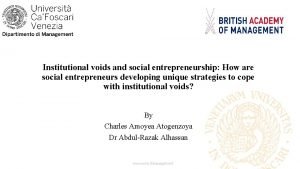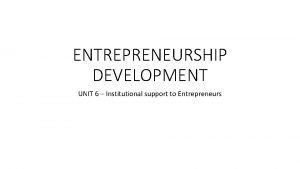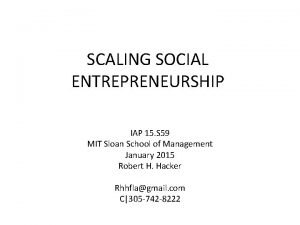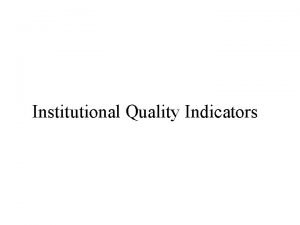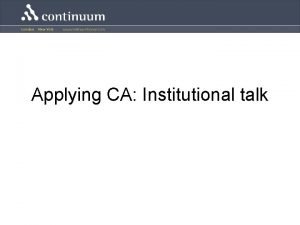Institutional voids and social entrepreneurship How are social













- Slides: 13

Institutional voids and social entrepreneurship: How are social entrepreneurs developing unique strategies to cope with institutional voids? By Charles Amoyea Atogenzoya Dr Abdul-Razak Alhassan www. unive. it/management

THEORETICAL BACKGROUND (1/3) • Firms’ ability to do business is either facilitated or constrained by the environment in which they operate, because institutions provide more than just background conditions for organisations (Meyer, et al. 2009). • A business’ performance and long-term survival is thus shaped by its ability to manage the institutional context of its operations. • Whilst developed economies have supportive formal institutions that facilitate businesses, many developing economies are fraught with institutional voids that stymie the operations of firms in such economies (Peng, 2003). • With the institutional contexts of developing economies varying greatly from developed ones, institutional voids are expected to impact SEs differently in comparison to both their Western counterparts and their local counterparts (traditional for-profit businesses). • Thus, whilst developing strategies to cope with institutions is important everywhere, it is more critical for the success of social entrepreneurs operating in developing economies due to the underdeveloped institutional regimes that such entrepreneurs face. www. unive. it/management

THEORETICAL BACKGROUND (2/3) • Institutional theory offers insights into how different institutional environments affect the behaviour of groups and organisations in different markets (Brutton et al. , 2009; North, 2005; Scott, 1995) by affecting the startup, structure and management of an entrepreneurial venture (Ebrashi & Darrag, 2017). • Thus, institutions are the rules of the game (North, 1990) as they directly influence the formulation and implementation of firms’ strategies (Ingram & Silverman, 2002). • These institutional factors affect the startup, management and growth of businesses either positively or negatively (Bruton et al. , 2010). • Based on this theory, institutional theory comprises of two opposing perspectives: Ø Institutional support perspective: the existence of effective institutions enables organisational development (Dacin et al. , 2010; Zahra et al. , 2009). Ø Institutional void perspective: the lack or ineffectiveness of institutions acts as a constraint on entrepreneurial development (Khanna & Palepou, 1997). www. unive. it/management

THEORETICAL BACKGROUND (3/3) • Research has shown that the lack of institutions can facilitate the development of SEs such that social entrepreneurship is more likely to occur in resource-scarce environments where social and environmental problems are abundant (Dacin, & Matear, 2010). • A countervailing perspective is that the lack of market supporting institutions negatively affects SEs’ ability to acquire fundamental resources to conduct business effectively just as in the case of conventional businesses (Khanna & Palepou 1997). • Taken together, the implication of the institutional void perspective in terms of social entrepreneurship is that voids may influence social entrepreneurial behavior, both as stimulants of motivation and as barriers to fundamental resource support to social entrepreneurs (Stephan, Uhlaner, & Stride, 2014). • In this paper, we focus on institutional voids as constraints to social entrepreneurship development. www. unive. it/management

MOTIVATION • Despite the widespread interest in the importance of SEs globally (Skoll Foundation, 2013; Short et al. , 2009), and the effects of institutional variation on organisations (Greenwood et al. , 2011), much of the research is largely Western-based (Littlewood and Holt, 2018). • In many ways, 1. our theoretical toolkits have been dominated by observations and insights based on developed market contexts and are somewhat misaligned with current realities facing organisations (Marquis and Raynard, 2015) especially in the developing world. 2. the few ones based on developing country contexts (i. e. , studies of institutional voids) have disproportionately focused on resource-endowed multinational enterprises (MNEs) (Meyer et al. , 2009) and the strategies they adopt to navigate formal institutional deficiencies (Luo, 2010). • But, as Khanna (2014) and Marquis and Raynard (2015) assert, theories and findings derived from developed market contexts are not wholly generalizable to emerging market contexts. • With organisations increasingly expanding into institutionally diverse settings, the relative fitness and practicability of transferring institutional strategies as “ready-made” solutions is called into question (Peng et al. , 2009). www. unive. it/management

MOTIVATION • As a result, this calls for increased research in developing new theories and testing existing ones on strategies that are suitable for the kind of institutional environments found in developing and emerging markets (Doherty et al. , 2014; Hiatt and Sine, 2014) in order to account for the diversity of the contemporary global market (Marquis and Raynard, 2015). • Drawing upon multiple-case study research, this paper seeks to strengthen and deepen our understanding of the nature of organisations’ strategic responses to institutional voids with a study of West African social enterprises. Research question What unique strategies are social entrepreneurs identifying and adopting to cope with institutional voids in institutionally underdeveloped settings? www. unive. it/management

METHODOLOGY (1/1) Method and Setting • Inductive, multiple-case study of small- and medium-sized SEs • 6 SEs operating in Ghana and Ivory Coast (in areas of IT education, art and craft, agriculture, justice, fitness, and energy). Uniqueness of setting • SEship is an emergent phenomenon • As a new phenomenon, there is stakeholder misunderstanding of the concept • Legally, there is no specific legal designation for SEs numerous organising challenges. (British Council, 2015) and this exposes them to • There is a general lack of interest and trust in locally produced goods and services, and even much more so in social enterprises’ products and services, in favour of foreign imported products. • • The institutional environment in Ghana and Ivory Coast mirrors the underdeveloped institutional settings that SMEs in developing countries operate in. www. unive. it/management

METHODOLOGY (1/1) Data Collection • 34 interviews (each interview lasting between 30 to 90 minutes) with 20 informants (24 with Social enterprise founders/managers and 10 with Front-line operators), between December 2019 to April 2020 • A total 50 days of non-participant observation (8 full working days at each organisation) • 54 documents (policy documents, practitioner articles, business publications, company annual reports, company websites, marketing material etc) Analysis • Open and axial coding www. unive. it/management

METHODOLOGY (1/3) Figure 1: Data Structure www. unive. it/management

EMPIRICAL ILLUSTRATIONS OF FINDINGS 3 C Model Diagram adopted and modified from Siegner et al (2018) www. unive. it/management

EMPIRICAL ILLUSTRATIONS OF FINDINGS Selected Representative Quotes www. unive. it/management

CONCLUSION • This study investigated the various strategies SEs adopt to cope with institutional voids. • We found that social entrepreneurs adopt various strategies (relational, creative action, training and development, formal business planning, and informal institution-building strategies) to tackle institutional voids. • The paper offers three main contributions: Ø First, it develops our understanding of the challenges faced by SEs and the different ways in which they (SEs) are responding to institutional voids in developing world contexts, with implications for wider entrepreneurship scholarship. Ø Second, this paper has implications for the strategic management of social enterprises in contexts in which institutional voids are present. Ø Finally, the strategic responses revealed in this study are expected to provide insight into policies needed to address impediments to entrepreneurial activity in challenging regions around the global economy. www. unive. it/management

THANK YOU FOR YOUR ATTENTION www. unive. it/management
 Institutional voids
Institutional voids Insidan region jh
Insidan region jh Institutions in aid of entrepreneurship development
Institutions in aid of entrepreneurship development Erroneous cubic cell
Erroneous cubic cell Octahedral voids in bcc
Octahedral voids in bcc How to plot zero air voids curve
How to plot zero air voids curve Position of tetrahedral voids in hcp
Position of tetrahedral voids in hcp Introduction to entrepreneurship module pdf
Introduction to entrepreneurship module pdf The social and ethical perspectives of entrepreneurship
The social and ethical perspectives of entrepreneurship Roles and importance of institutional investors
Roles and importance of institutional investors Mit social entrepreneurship
Mit social entrepreneurship Social factors affecting entrepreneurship
Social factors affecting entrepreneurship Digital social entrepreneurship
Digital social entrepreneurship Institutional medicaid
Institutional medicaid
